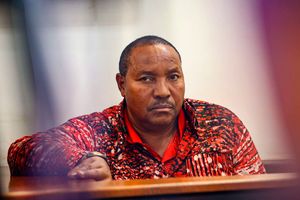Premium
Labour court extends order barring removal of LSK CEO

Law Society of Kenya CEO Mercy Kalondu Wambua.
The Labour court has extended orders stopping the recruitment of a new chief executive officer for the Law Society of Kenya (LSK) to replace Mercy Kalondu Wambua, as power wrangles in the organisation persist.
Justice Maureen Onyango on Thursday ordered that the status quo remains up to September 24, 2021 when the court will hear a request by Ms Wambua to have LSK president Nelson Havi cited for contempt.
Ms Wambua wants Mr Havi committed to civil jail for chairing the organisation’s special general meeting, which resolved to send her on compulsory leave with full salary, and recruit another CEO.
In the meeting held on June 26, 2021, LSK members also resolved to remove Ms Wambua as a signatory of the organisation’s bank accounts.
But Ms Wambua rushed to court and obtained an order stopping implementation of the resolutions.
She told court that the meeting as well as the resolutions were contrary to an earlier order issued in December last year barring the LSK president from instituting leadership changes in the lawyers’ lobby group.
Contract to end in 2022
The CEO argues that her contract will end in February 2022 and plans of her replacement violate her rights, hence LSK should be stopped from terminating her contract.
She says Mr Havi’s decision of to enforce the resolution of the LSK special general meeting is in contempt.
However, Mr Havi in his court filings against the contempt application says the matter ought not to be heard because the proceedings of the case were suspended in December last year.
A further order on the case was issued by the court on June 17, 2021 when the court declined his request for review of the decision to suspend the proceedings.
“I have not disobeyed the order made on December 1, 2020. An order for my committal should not issue nor should an injunction be granted in the manner sought by Ms Wambua,” says Mr Havi.
In regard to claims that it was illegal for him to chair the special general meeting, Mr Havi says his duties and functions as president of LSK entail pursuing and implementing the vision of the group.
His duty is also to chair general meetings and council meetings, signing and implementing resolutions made as well as communicating the same to members of the organisation and third parties.
Contract terminated
Ms Wambua’s contract was terminated in October 2020, leading to the court battle that suspended the termination in December. The court also barred her removal from office pending determination of the case.
But Mr Havi says the order (to bar termination of her contract and suspending the proceedings of the case) effectively reinstated Ms Wambua to office.
He says there is no possibility that the proceedings of the case will resume and the dispute be determined before February 2022 when Ms Wambua’s tenure will be ending.
“Emboldened by the orders, the CEO has, with a view of defeating the ends of justice and undermining elected leadership of LSK, acted unlawfully, resulting in the decision by members on June 26 (to remove her from office),” says Mr Havi.
He cites MS Wambua’s four decisions that he says have aggrieved members of the organisation. One of them is the CEO’s move to oversee appointment of a parallel forensic auditor to defeat the forensic audit of the LSK financial books.
Further, he says in a meeting she called on February 8, 2021, Ms Wambua led his suspension over allegations of misconduct.
In addition, he claims the CEO called for a general meeting of LSK members on March 27, 2021 for purposes of removing him as president.
“She purported to countermand the appointment of the representative of LSK to the IEBC commissioners’ selection panel as communicated by myself to the Parliamentary Service Commission and forwarded another name,” states Mr Havi.
He argues that Ms Wambua is using the orders of the court to defeat justice.





